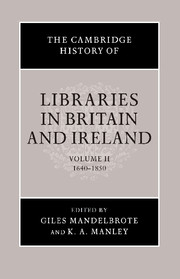Book contents
- Frontmatter
- 1 Introduction: the changing world of libraries – from cloister to hearth
- PART ONE THE EXPANSION OF BOOK COLLECTIONS 1640–1750
- 2 Ancients and moderns: cross-currents in early modern intellectual life
- 3 Libraries, books and learning, from bacon to the enlightenment
- 4 Opportunities for building collections and libraries
- 5 Libraries for school education and personal devotion
- 6 Libraries for the parish: individual donors and charitable societies
- 7 Endowed libraries for towns
- 8 Libraries in university towns
- 9 Ecclesiastical libraries: libraries for the higher clergy
- 10 Libraries for antiquaries and heralds
- 11 Professional collections: libraries for scientists and doctors
- 12 Personal owners of books
- 13 Library buildings and fittings
- 14 Baroque librarianship
- PART TWO LIBRARY DEVELOPMENT AT A LOCAL LEVEL
- PART THREE PROVINCIAL AND METROPOLITAN LIBRARIES 1750–1850
- Select bibliography
- Index
- References
3 - Libraries, books and learning, from bacon to the enlightenment
from PART ONE - THE EXPANSION OF BOOK COLLECTIONS 1640–1750
Published online by Cambridge University Press: 28 March 2008
- Frontmatter
- 1 Introduction: the changing world of libraries – from cloister to hearth
- PART ONE THE EXPANSION OF BOOK COLLECTIONS 1640–1750
- 2 Ancients and moderns: cross-currents in early modern intellectual life
- 3 Libraries, books and learning, from bacon to the enlightenment
- 4 Opportunities for building collections and libraries
- 5 Libraries for school education and personal devotion
- 6 Libraries for the parish: individual donors and charitable societies
- 7 Endowed libraries for towns
- 8 Libraries in university towns
- 9 Ecclesiastical libraries: libraries for the higher clergy
- 10 Libraries for antiquaries and heralds
- 11 Professional collections: libraries for scientists and doctors
- 12 Personal owners of books
- 13 Library buildings and fittings
- 14 Baroque librarianship
- PART TWO LIBRARY DEVELOPMENT AT A LOCAL LEVEL
- PART THREE PROVINCIAL AND METROPOLITAN LIBRARIES 1750–1850
- Select bibliography
- Index
- References
Summary
When Francis Bacon wrote that ‘books must follow sciences, and not sciences books’, he voiced an increasingly dominant view of the role of the book in early modern intellectual life. This had important consequences for the role of the library as an institution of learning. Over the previous century, the library had shed its Renaissance image of a store-house of books and treasure-chest of knowledge to become regarded as an institution equal in status to the learned societies and academies, colleges and universities, museums and laboratories which dotted the contemporary intellectual landscape. Its purpose was not only to serve as an archive of learning, but also to assist in the active dissemination of knowledge. The library had come to have rules, protocols and a cultural ethos all of its own. It was a place of social interaction, polite conversation and intellectual exchange. Libraries, even humble ones, were frequently hodgepodge collections not only of printed books but also of pamphlets, printed ephemera and manuscripts of all kinds; of sketches, woodcuts, engravings and paintings; of natural, ‘artificial’ and historical rarities. Books and objects were expensive, and a well-stocked library meant deep pockets on the part of institutions and patrons. Consequently the libraries of wealthy collectors and well-funded institutions could be ornate and even pompous affairs, meant to dazzle the beholder. But so too, libraries were hard-working tools of learning. Carefully catalogued and indexed, working libraries served contingents of scholars from a variety of intellectual backgrounds.
- Type
- Chapter
- Information
- Publisher: Cambridge University PressPrint publication year: 2006
References
- 3
- Cited by

